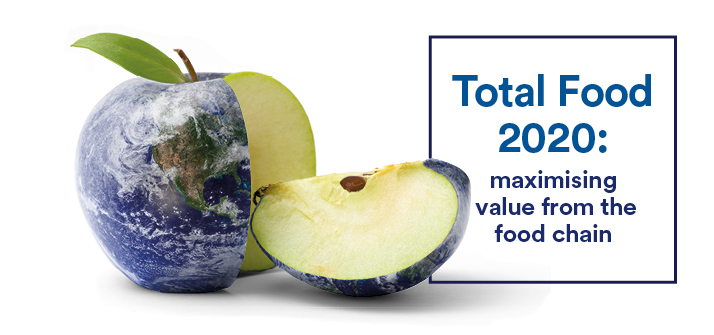
January 29, 2020, by Jo Gregory
Total Food 2020: maximising value from the food chain
Total Food 2020 is taking place at the East Midlands Conference Centre in Nottingham from the 14th-17th April 2020. The conference is sponsored by the Green Chemicals Beacon and the Future Food Beacon and will bring together industrialists, academics, policy-makers and charities with the common goal of protecting the environment and promoting human and animal health through waste minimisation and the optimal exploitation of co-products.
In this post, Jo Gregory talks to Professor Keith Waldron, Director at Anglia Science Writing and founder of the Total Food Conference, about the origins of the conference and how it has evolved.
How did the idea for the first Total Food conference come about?
By the early 2000s, food waste was a recognised issue and was becoming highly topical. At the Institute of Food Research (IFR) we had been working in the area for about 10 years. My colleagues and I, who were members of the Royal Society of Chemistry (RSC) Food Group identified the food waste topic as a potential focus for a conference. The RSC Food Group was pleased to sponsor the venture and the first conference was planned for 2004. The meeting was run by the IFR and comprised plenary lectures, short talks, poster sessions and focused workshops. The success of the conference led to further conferences every 2 or 3 years.
What did you hope to achieve?
We hoped to create a regular forum for the presentation and discussion of research, development and innovation relevant to the exploitation and minimisation of agri-food chain waste streams. Many scientific conferences are focused on scientific disciplines. We wanted to provide a truly multidisciplinary platform to bring together researchers and stakeholders from complementary fields.
Was there a particular audience you wanted to attract to the conference?
The key stakeholder groups included international representatives of the food industry, the scientific community, legislators and consumer organisations. Their involvement allowed the first conference in 2004 to cover key multidisciplinary topics, particularly: High-value products from waste, bulk product exploitation, non-food use (including biodegradable materials) and disposal of low-value residues. We also held several interactive workshops to discuss areas such as technology transfer, current and emerging markets and aid for industry in exploiting research.
How has the conference evolved?
The conference has evolved in a number of ways. We have regularly engaged with other groups to enhance added value and synergy, for example, multinational projects on food waste, societies and federations such as The European Federation of Food Science and Technology (EFFoST) for Total Food 2006 (held in the Hague) and networks such as the Biotechnology and Biological Sciences Research Council (BBSRC) networks in Biotechnology and Bioenergy for Total Food 2014. The conference proceedings have often been published, for example, in-house, with the RSC, and as a special issue with the scientific journal Food Chemistry. The scope of the conference has also continually evolved to address emerging topics such as biofuels, biochemicals, bioplastics etc. It has also sought to consider whole chain issues from consumer preferences through to supply chain logistics and availability of co-products and waste streams, and the assessment of environmental impact and economic potential.
The registration deadline is 22 March. Programme details and booking available here.
There are also discounted rates for students (student bursaries are available) and SMEs.
…In our next post, Dr Eleanor Binner, Associate Professor in Chemical and Environmental Engineering and conference chair for Total Food 2020, will talk about the theme for this year’s conference, why maximising value from the food chain is so important, and why Nottingham is the ideal location.
No comments yet, fill out a comment to be the first

Leave a Reply